|
|
 Neil Armstrong and Buzz Aldrin are household names (although admittedly they and John Glenn are the only two astronaut names I recognize); they and the astronauts who originated the space program in particular are American national heroes. But their wives, while often in the spotlight alongside them, have been neglected as people. Groomed as ideal 50’s housewives, even when the 50’s were over, the wives of the astronauts never got much of a chance to show their own personalities, as whoever they were was sidelined in support of their famous husbands. But it wasn’t easy holding on while the man you loved was orbiting the earth or touching down on the moon. The Astronaut Wives Club is their story. Neil Armstrong and Buzz Aldrin are household names (although admittedly they and John Glenn are the only two astronaut names I recognize); they and the astronauts who originated the space program in particular are American national heroes. But their wives, while often in the spotlight alongside them, have been neglected as people. Groomed as ideal 50’s housewives, even when the 50’s were over, the wives of the astronauts never got much of a chance to show their own personalities, as whoever they were was sidelined in support of their famous husbands. But it wasn’t easy holding on while the man you loved was orbiting the earth or touching down on the moon. The Astronaut Wives Club is their story.
Although the mechanics of space flight are well over my head, the fact that human beings have flown into space is fascinating. These men – and now women – have truly put their lives at risk in pursuit of better knowledge and understanding for all of us. As I studied Russian in high school and college, the space race was something that we learned about in detail; I think I’ve probably heard more about Laika and Yuri Gagarin personally than I have about our own American astronauts. It’s a fascinating topic for me, and how much more fascinating are the lives of the women who supported these famous men in their endeavors? I’d heard some hype about The Astronaut Wives Club and I thought it was worth reading for myself.
Unfortunately, I found this book very disappointing. I definitely did not feel like I got to know the real personalities of any of the wives at all, though Koppel had access to a number of them for private interviews. The book is organized in groups of astronauts, so we start with the Mercury wives, then the Gemini wives, and finally the Apollo wives, and some of the wives stick through the whole book. But because there are so very many wives covered, it’s impossible to get to know any of them, and I kept forgetting which wife was married to which astronaut. I have an ARC, so I’m hoping the full edition has some sort of guide as to who is who, as well as some pictures, particularly since clothes and jewelry are described in great detail.
Even when I could remember who the wives were, their personalities are hardly painted with any level of detail, especially once the Gemini wives come into the picture. They decry the fact that they had to be portrayed in the press as perfect housewives when in reality they were women with feelings and thoughts and ambitions of their own, but this book certainly doesn’t get across the latter. They’re broad caricatures, defined almost exclusively, still, by what their husbands are doing. When her husband goes off into space, each woman gets a section to herself, but this mainly consists of anxiety about the flight and how they react to the potential loss of their husbands. They all worry that their husbands are having affairs (and with good cause as many of them did just that). The first Astrowife to get a divorce is really only depicted in the context of that divorce. The book is so short and there are so many wives that there is simply no chance to talk about anything else.
I suspect this book would have been much stronger if the focus was narrower. At the moment, while it’s organized, it feels like nothing more than a surface glimpse, with nothing of substance, and I don’t necessarily feel I actually understand the struggle of these women in any more detail than I might have guessed for myself. If the author had chosen to focus on just the Mercury Seven, or on one wife from each group, or something to that effect, I think the book would have been a lot stronger. Instead, it’s simply a chatty, gossipy commentary that only skims the surface of the true feelings and personalities of these women. Disappointing.
All external links are affiliate links. I received this book for free for review.
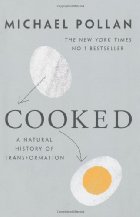 Americans love watching people cook, on TV and in restaurants, and they love eating delicious food (along with taking pictures of it). But cooking times on average are the lowest they’ve ever been, with the average person spending less than 30 minutes preparing a meal every day. People are getting larger on the whole and diets are incredibly unhealthy, yet we’re obsessed with food. To rediscover our lost cooking heritage, Michael Pollan delves into cooking with each of the four elements – fire, air, water, and earth – and discloses the results and his discoveries in this book. Americans love watching people cook, on TV and in restaurants, and they love eating delicious food (along with taking pictures of it). But cooking times on average are the lowest they’ve ever been, with the average person spending less than 30 minutes preparing a meal every day. People are getting larger on the whole and diets are incredibly unhealthy, yet we’re obsessed with food. To rediscover our lost cooking heritage, Michael Pollan delves into cooking with each of the four elements – fire, air, water, and earth – and discloses the results and his discoveries in this book.
I am a very inconsistent cook. Sometimes I want to make everything from scratch, by hand, as best as I possibly can. Tomato sauce is an example of this – I’m convinced that when I make it myself, it’s the best thing ever, but I rarely feel I have enough time to make that happen, even though it mostly involves browning meat and throwing ingredients in the slow cooker, which isn’t particularly time-consuming. I’ve long harbored a not-so-secret desire to start making my own bread and I’ve managed to move us slowly away from making packaged microwave meals (at least for dinner) and cooking proper food. But sometimes, perhaps like everyone, I just can’t bring myself to find the energy to cook something, and so we end up eating fast food – exactly how Pollan describes is probably damaging to our health.
I thought Cooked was fascinating primarily because most of what Pollan delves into *is* actually lost. If we were faced with an entire pig, we probably wouldn’t know how to cook it over an open flame without burning half and undercooking the other half. Making sourdough bread from scratch with just flour and water? How flour is actually made and which parts we eat and don’t eat? I didn’t know how to do any of these, much less make beer or cheese, nor did Pollan. His discovery was really interesting to me and made me want to make what he makes myself, just to see how it happens.
Of course, the main reason we have stopped making food ourselves is time. Brewing beer takes weeks. Making a loaf of bread requires a week’s advance preparation, if you don’t already have a starter, and if you do, you need to take care of it every day. Even braising meat takes hours of chopping, slow cooking, and monitoring. Processing has taken on these jobs for us, so that we now don’t even understand half the ingredients in the food we eat. But Pollan gains essential skills that we’ve lost, a way to feel for how to make food and how to experiment with it and how to tell when it’s as delicious as possible. He’s no longer tied to recipes.
Along the way Pollan delves very tentatively into racial and gender politics – how certain kinds of people don’t touch certain kinds of cooking because it’s been “claimed” or historically “beneath” them. He also explores how processed food became the so-called savior of housewives, even though when surveyed, most housewives preferred cooking to any other chore. And how professional cooking is a man’s domain, but somehow cooking at home is a woman’s domain even though the concepts are the same. He doesn’t explore these topics very far – the book isn’t about this at all – but it made me think about that phenomenon, which I’d already noticed.
But primarily what Pollan discovers is that cooking is pretty amazing. We can turn raw plants, most of which we couldn’t even identify in the wild, and animals into delicious things by some of the strangest processes (particularly in the earth section). We’ve lost real skills that mean valuable things for our health. Isn’t it time we started re-claiming the kitchen?
All external book links are affiliate links. I received this book for free for review.
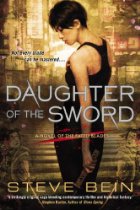 I could sum up this review with just four words: this book was awesome. I could sum up this review with just four words: this book was awesome.
Daughter of the Sword is about a group of swords created by master Japanese craftsman Inazuma. In the present day, only three swords are known, and Mariko Oshiro, the only female detective in the Tokyo Police Department, is about to become acquainted with one. Constantly fighting for her place in the department already, Mariko faces fierce sexism in her determination to prove herself. Instead of a case which is easily solved, she’s sent all the way across town to help an older man, Professor Yamada, in a seemingly inconsequential case. Twined in with her story are those of other sword owners, set in a variety of historic versions of Japan, as we learn more about the swords’ unique personalities and their context throughout history.
This book combined so many fantastic elements to create a beautifully cohesive whole that was simply a pleasure to read. I loved each and every story as we followed the swords throughout history. I’m not all that familiar with Japanese history, but I love the feel of these and I relished in the unfamiliar. I liked getting back to Mariko, but I also felt like each of the smaller stories was surprisingly fleshed out for a relatively short book. They added so much context and history which could have otherwise been lost in big city Tokyo – it’s a clever construction that adds layers of Japanese culture onto a modern day bustling city and police department.
Contrasted with these beautiful bits of history, the yakuza, or Japanese mafia, comes to light through the character of the villain, a man who has and is seduced by one sword but is determined to have two. I’d never even heard of the yakuza before, but having poked around on the internet, it appears to be a real thing, an institutionalized part of Japanese culture. He’s not exactly a pure villain, though; how many villains go and visit their fathers in the hospital in the course of a story?
And then there is Mariko herself, who is a wonderful main character, so determined and stubborn and ambitious. The sexism that she comes up against is so frustrating that I wanted to scream against her superiors myself. She is Japanese, but because she grew up in the United States instead of in Japan, she is determined to fight against the trend and make a name for herself, paving the way for other female detectives in Tokyo, while the establishment is firmly against her. This not only helps this American reader cheer her on, but gives those who are not Japanese an easy way in to start trying to come to grips with a culture that is mostly unfamiliar to us.
The fantasy touches in this book are very very light, mainly around the personalities of the swords and the way they influence their owners. I thought the focus on swords was fantastic, but I have a strange fascination with swords anyway, so your opinion of this may vary. But I love books that take a single element and use them to tie everything together, and in this case, all was beautifully done.
Very highly recommended! I can’t wait for the release of book 2 in December.
All external book links are affiliate links. I purchased this book.
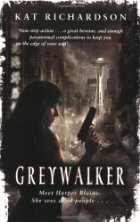 I’ll admit that I am not the world’s pickiest reader. I adore urban fantasy and I am often very willing to overlook faults in one of these books if one of the elements in the book – the world, character development, general plot, etc – stands up to me as worth reading. I have series in the genre that I adore, like the October Daye and Kate Daniel series, and I have some that I generally keep reading because they’re amusing and quick and keep my mind busy. I never know what to expect when I start a new series, and I’d heard some great reviews of Kat Richardson’s books. I’ll admit that I am not the world’s pickiest reader. I adore urban fantasy and I am often very willing to overlook faults in one of these books if one of the elements in the book – the world, character development, general plot, etc – stands up to me as worth reading. I have series in the genre that I adore, like the October Daye and Kate Daniel series, and I have some that I generally keep reading because they’re amusing and quick and keep my mind busy. I never know what to expect when I start a new series, and I’d heard some great reviews of Kat Richardson’s books.
Unfortunately, I completely failed to connect with Greywalker. I just couldn’t become invested or interested in the plot. It seemed like the heroine spent the entire book just talking to people. She’d go to the office, talk to people on the phone, go investigate in the evenings, talk to more people, and so on. It’s a shame because it starts out fantastic. She actually dies for two minutes after being attacked and, when she wakes up, discovers that she can suddenly “see” a whole other dimension of the world which is called the Grey, hence the title of the book. Unfortunately her discovery of the Grey mostly leads to her spending a lot of time talking about it, and when she does experience it, it’s mostly confusing and then needs to be explained. I still don’t really feel like I have a handle on what exactly she can do there or even what it is, probably because she spends most of the book denying that she has this new ability.
There are aspects of it that I should have liked. The setting is a good one. It feels very much like the book was set in the early 90’s. All of the characters have pagers, for one thing, which just seemed odd to me, as I’m mostly too young to have experienced the actual use of pagers in every day life. The book is set in Seattle and has a very rainy, very appropriately grey vibe pervading it. Harper also seems older than a standard urban fantasy heroine, experienced in her job and to a degree set in her ways.
But as a character, she didn’t appeal to me very much. Despite the drastic beginning of the story, she didn’t change very much, and I couldn’t understand why the main love interest was actually attracted to her, especially after a few of the events in the story took place. Not that I liked him much, either; all of the characters felt peculiarly shallow and I didn’t really care what happened to them. Harper is meant to be special, but I couldn’t really figure out why she in particular was special or what purpose she actually served that another person who could see the Grey couldn’t. Maybe my brain was just working too slowly while I was reading, but the details of the story just never fleshed out and became clear.
At this point I’m not sure I want to read the rest of the series. I’ll definitely get it out of the library if I do. Has anyone else continued reading and found it worth persevering?
I purchased this book.
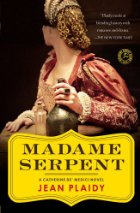 I have a confession: I’ve never actually been very fond of Jean Plaidy’s books. They’ve always seemed very popular to me with other historical fiction bloggers, but I haven’t actually reviewed any of them here. I read a couple of her Tudor books way back before I started blogging, so unfortunately I remember very little other than the fact that they were uninspiring. I was completely in love with historical fiction seven years ago, particularly the Tudors, so this was a huge disappointment. Then a few months ago I got the re-releases of her Catherine de Medici trilogy for review. They sat for those few months, as they were unsolicited and I wasn’t sure I’d like them, but I brought them over to the UK with me because they were light and I really should beef up my historical fiction reading again. I have a confession: I’ve never actually been very fond of Jean Plaidy’s books. They’ve always seemed very popular to me with other historical fiction bloggers, but I haven’t actually reviewed any of them here. I read a couple of her Tudor books way back before I started blogging, so unfortunately I remember very little other than the fact that they were uninspiring. I was completely in love with historical fiction seven years ago, particularly the Tudors, so this was a huge disappointment. Then a few months ago I got the re-releases of her Catherine de Medici trilogy for review. They sat for those few months, as they were unsolicited and I wasn’t sure I’d like them, but I brought them over to the UK with me because they were light and I really should beef up my historical fiction reading again.
Imagine my surprise when I cracked open Madame Serpent and found myself enjoying it – a lot! Catherine is very young in this book and I loved watching her turn into her more famous, scheming incarnation over the course of this novel. Starting in Italy, Catherine endures the difficulties of Florentine instability at a young age; her uncle, the Pope, decides that the Medici family is destined for further greatness and arranges her marriage to one of the French King Francis’s sons, Henry. Henry isn’t the heir, but for an essentially merchant family marrying into the greatest monarchy of the time, this is a huge step. Catherine’s feelings are never a consideration, of course; her love for her cousin and her country is dismissed. Catherine’s character is tested even further when she discovers that the heart of her young husband has already been captured by a much older woman, Diane de Poitiers, and while she falls passionately in love with him, she must watch him long for another woman.
Though the novel flips around between the perspective of several different characters, Catherine is very obviously the primary focus from the start; everyone else’s narrative simply exists to flesh out the space around hers. This book is a lot of set-up, as it’s the first in an entire trilogy about Catherine, covering her life from her childhood up to the birth of her youngest child. I find that most historical fiction focused on women slows down drastically when the main character starts having babies, mostly because they spend a lot of time having children and then recovering from having children, and there is a little bit of that here, but nothing particularly drastic. In addition, the author needs to set up Catherine’s relationships with her children, as I have a feeling they’ll be adding considerably to her later years.
Primarily, what this book shows is that, when Catherine is dismissed as a weak woman whose only function is to bear heirs to the French throne, when her family and her husband neglect her, and when she reaches the very end of her rope, she’s able to find the strength inside to subvert all expectations and become very powerful indeed. I have the feeling I will enjoy the rest of this trilogy greatly, and I’m very glad to have the next two books already waiting on the shelves.
I received this book for free for review. All external book links are affiliate links.
 “A Diamond is Forever” has become one of those advertising slogans that gets burned into a young American’s brain forever. I know just one person who got engaged without a diamond ring and I suspect most people do think that diamond engagement rings were always the standard. Not so – certainly not until Mary Frances Gerety penned those four lines and Ayer built an advertising campaign around engagement. In The Engagements, Sullivan takes a few wildly different relationships from the 1960s to the present day and explores love, with and without diamond rings, throughout the last fifty years. “A Diamond is Forever” has become one of those advertising slogans that gets burned into a young American’s brain forever. I know just one person who got engaged without a diamond ring and I suspect most people do think that diamond engagement rings were always the standard. Not so – certainly not until Mary Frances Gerety penned those four lines and Ayer built an advertising campaign around engagement. In The Engagements, Sullivan takes a few wildly different relationships from the 1960s to the present day and explores love, with and without diamond rings, throughout the last fifty years.
I had really high expectations for this book when I started it and I’m pleased to say it met all of them. I liked the many different perspectives on love, and particularly the focus on how little an engagement ring really means. A diamond may last forever, but it’s the couple that gives it meaning. Some of these couples do, and some of them don’t, but all of them have interesting, engaging stories that emerge believably from Sullivan’s pen. As she cycles between characters, she accomplished an amazing feat for me – I liked all of the different eras. I was interested in the outcome of all of the marriages.
I also just liked seeing how different each of the relationships was. One of the couples has been together for years, and it’s their son who is having the difficulty with his marriage. Another of the characters has left her husband for a whirlwind engagement, while a third adores his wife but can’t afford the diamond he believes she deserves. And one of the characters in Frances Gerety herself, who despite writing such a line, never married. Instead, she remained a “career woman” and remained at Ayer throughout her working life. It’s a window into a different world, as she’s a single woman with a steady, surprisingly typical office job, in contrast to the numerous other relationships in the book. Plus, we get an idea of how advertising works, and how these companies managed to completely change perceptions in a way that has lasted decades. Ayer doesn’t even exist now but people are still buying diamond engagement rings.
While there are a number of failed relationships, Sullivan doesn’t shy away from the successful ones, so this book isn’t at all depressing. Instead I found it uplifting, sweet, and thoughtful, with a measure of gravity; every relationship is different and has its own meaning and its own outcome. I loved the way that, in the end, all of the relationships were tied together and very cleverly so.
The Engagements is a fantastic book, a great story of a little period of history and how much relationships have changed throughout. Highly recommended.
All external book links are affiliate links. I received this book for free for review.
 Hello everyone. It’s been silent here for one of the longest stretches in blogging memory, and I only managed to post a review last week because I’d written it significantly ahead of time. My family have had a rough week and a half as my grandma passed away last Sunday night, and I flew home to the United States last Tuesday for her wake and funeral. My grandma was a wonderful woman, and my favorite grandparent by far, so this has been a difficult time, and was a really hard end to June. But at least her struggles are over and she can rest in peace, and life will now resume some semblance of normality for the rest of my family too. Hello everyone. It’s been silent here for one of the longest stretches in blogging memory, and I only managed to post a review last week because I’d written it significantly ahead of time. My family have had a rough week and a half as my grandma passed away last Sunday night, and I flew home to the United States last Tuesday for her wake and funeral. My grandma was a wonderful woman, and my favorite grandparent by far, so this has been a difficult time, and was a really hard end to June. But at least her struggles are over and she can rest in peace, and life will now resume some semblance of normality for the rest of my family too.
As you can imagine, I spent a lot of June buried in books. And not writing reviews of them. I really had very little enthusiasm or energy for anything at all. I had a brief period where I started to get my energy back and I had three days of posts in a row, and I’m hoping that will happen again and stick around this time in a couple of weeks. I’ve read so many amazing books and I really do want to talk about them, so I intend to do so eventually, even if only in mini reviews. (And this week I will choose winners of my giveaway – apologies to those waiting for the news!) I’m as usual reading a lot of series, and I think I’ll probably write little cluster reviews rather than individually review books, like with the Confederation novels by Tanya Huff.
Fiction
- The Heart of Valor, Tanya Huff
- The Enchanted April, Elizabeth von Arnim
- Tipping the Velvet, Sarah Waters
- Deception, Kris Kennedy
- Three Parts Dead, Max Gladstone
- The Better Part of Darkness, Kelly Gay
- Have His Carcase, Dorothy L. Sayers
- Gaudy Night, Dorothy L. Sayers
- Busman’s Honeymoon, Dorothy L. Sayers (yes, I went on a binge)
- Graveminder, Melissa Marr
- Shapeshifted, Cassie Alexander
- Elisha Barber, E. C. Ambrose
Non-fiction
- Pompeii, Mary Beard
- The Churchills, Mary S. Lovell
Favorites of the Month
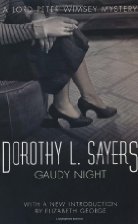  
I continue to love the Confederation novels; The Heart of Valor made me instantly buy the next two in the series, after which I *think* it ends. I also spent a good week immersed in the world of Lord Peter Wimsey and Harriet Vane, but Gaudy Night was (predictably) my favorite, as it not only brings up a lot to think about and an interesting perspective on academia for women at the time, but also shows Harriet’s opinion of Peter changing beautifully for the better. And Pompeii was just fascinating. All recommended.
What’s Ahead in July
More posts, I hope! Here are the books I have lined up to read over the course of the rest of this month:
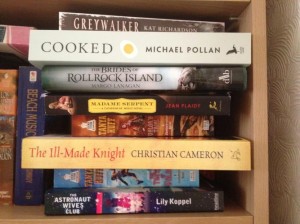
I’m actually looking forward to all of these books without exception. You can see that I want to finish the Confederation novels, as they’re both on the pile. And look, there are even two works of historical fiction, so I might actually feature a book that is in my “niche”. Crazy.
What’s ahead for you in July?
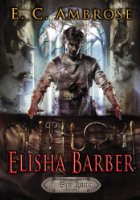 Elisha Barber lives in a fourteenth century England with witches and mages, unlike our own world, and war, poverty, and suffering, very much like it. He does all he can with his two hands, both acting as a barber, cutting and shaving men and women alike, and as a surgeon, plying the medical trade to save lives. But when he fails to save the life of his brother’s child, or indeed his brother himself, due to a feud that he initiated, Elisha can hardly live with his sins, and his capture by the king’s men is almost a mercy. Sent to practice his trade on wounded battlefield soldiers, Elisha learns to practice his true gift in the face of opposition thrown at him from every possible angle. Elisha Barber lives in a fourteenth century England with witches and mages, unlike our own world, and war, poverty, and suffering, very much like it. He does all he can with his two hands, both acting as a barber, cutting and shaving men and women alike, and as a surgeon, plying the medical trade to save lives. But when he fails to save the life of his brother’s child, or indeed his brother himself, due to a feud that he initiated, Elisha can hardly live with his sins, and his capture by the king’s men is almost a mercy. Sent to practice his trade on wounded battlefield soldiers, Elisha learns to practice his true gift in the face of opposition thrown at him from every possible angle.
This book starts off rocky. It’s hard to explain why; I think it just took a little while for the book to find its purpose and its actual story. The first few chapters are almost like a prologue, an explanation as to why Elisha gets where he’s going, and as such don’t really feel like they fit the story as well as they might. Once I’d persevered past that point, though, I could see why it was chosen to go first, because the rest of the story can’t happen without it. It’s worth continuing, in any case, if you do find yourself somewhat stuck there, as what comes after is a lot better than the beginning.
Mainly, this is because we see Elisha in his element, and start to actually learn more about the world that he lives in. His skills as a medical practitioner start to come through, and we can admire the fact that he’s saving men’s lives and fighting in the face of “modern” medicine. Of course, some medieval medicine did more harm than good, while some actually was perfectly sufficient, and Elisha experiences both kinds, although more of the former than the latter.
In terms of characterization, Elisha is the only character that we actually come to know particularly well; the book is experienced exclusively through his perspective, although it’s narrated in third person. Everyone else seems to be the mirrors through which he discovers himself and what he can actually do. Most of the characters are either good or bad, aside from a couple whose intervention changes his life at various times. A lot of the characters are somewhat stereotypical peasants with hearts of gold, while the truly “bad” characters are nobility. But there is enough variation amongst the nobility to avoid falling into any traps, and in any case, Elisha is the star of the show, with the book a bit too short for us to get to know anyone else particularly well.
Finally, the magic system. Mages in this book have a few skills; they can talk to one another through various mediums and they can transform similar objects into other objects. They also seem able to feel other people’s emotions by attuning themselves to the environment and other people, but I felt like that particular skill wasn’t as well defined. There are other abilities too, but they were also not as clearly defined, leaving me to wonder what else the author might come up with!
In all, Elisha Barber was a very solid, ultimately enjoyable read – a great choice for someone who enjoys reading about medieval England and fantasy rolled up into one. I’ll definitely keep my eyes open for the next in the series.
All external book links are affiliate links. I received this book for free for review.
UK readers, exciting news; I have five signed ARCs of The Ill-Made Knight to give away! This book sounds fantastic and I can’t wait to dig into my copy. It’s not due out until the 1st of August, so this is your chance to read a great work of historical fiction before it hits the book store. 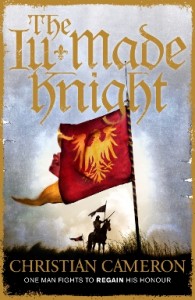 Here’s the description: Here’s the description:
An action-packed tale of chivalry and betrayal set during the Hundred Years War. William Gold comes into the world as his family slides down the social ladder. His head filled with tales of chivalry, instead he is branded a thief, and must make do with being squire to his childhood friend Sir Robert, a knight determined to make a name for himself as a man at arms in France. While William himself slowly acquires the skills of knightly combat, he remains an outsider – until the Battle of Poitiers when Sir Robert is cut down by the greatest knight of the age, Sir Geoffrey de Charny, and William, his lowly squire, revenges him. But with his own knight dead, no honour acrrues to William for this feat of arms, and he is forced to become a mercenary. Scavenging a mis-matched set of armour from the knightly corpses, he joins one of the mercenary companies now set to pillage a defenceless France, and so begins a bloody career that sees William joining forces with the infamous Sir John Hawkwood and immersing himself in a treacherous clandestine war among the Italian city states. But paradoxically it is there, among the spies, assassins and hired killers serving their ruthless masters, that William finally discovers the true meaning of chivalry – and his destiny as a knight.
To win one of the five signed ARCs, please fill in the following form. Just let me know what your favourite period in history is. Winners will be selected by random lottery and you’ll be contacted by me within 24 hours of the contest’s close so that I can find out your address. The contest closes on the 3rd of July. Good luck!
If you can’t see the form, please visit this link to enter.
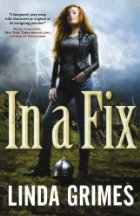 Ciel Halligan is a chameleon-like aura adapter; she can change shape to look and sound just like anyone she touches. She runs her own little business and transforms into her clients to get them out of sticky situations and endure events that they simply can’t take. Her latest job is persuading a client’s boyfriend, Trey, to propose on vacation. Everything’s going perfectly until the villa explodes, Trey disappears, and Ciel’s friends Mark and Billy turn up to protect her. The villains? Modern-day Vikings who have it in for both Ciel and the male population. Ciel Halligan is a chameleon-like aura adapter; she can change shape to look and sound just like anyone she touches. She runs her own little business and transforms into her clients to get them out of sticky situations and endure events that they simply can’t take. Her latest job is persuading a client’s boyfriend, Trey, to propose on vacation. Everything’s going perfectly until the villa explodes, Trey disappears, and Ciel’s friends Mark and Billy turn up to protect her. The villains? Modern-day Vikings who have it in for both Ciel and the male population.
Urban fantasy has been my addiction for some time now, and I’m always eager to add a new series to my shelves while I wait for other authors to release further books in my already-beloved series. In a Fix is definitely on the lighter side of the urban fantasy spectrum, and not precisely “urban” either, as there isn’t a focal city in the book as there is in so many of them.
I liked the initial idea behind this book, with shapeshifters who basically take on the difficult situations of others as a job. There are plenty of times when I think we’d all like to hire a duplicate of ourselves to deal with an event that we really couldn’t be bothered with ourselves.
Unfortunately, I really didn’t like much else about this book at all. The main character, Ciel, was so irresponsible that she drove me insane. She needed to be rescued by her male cohorts what seemed like every other page, as she went charging in no matter what, sometimes only seconds behind them. There are only so many times I can deal with someone getting caught by the exact same bad guys because of their own stupidity. She doesn’t even start off well, as her first job has a contract that allows her to sleep with another woman’s boyfriend / planned-to-be fiance for the purposes of securing “the ring”. That whole scenario makes me feel uncomfortable. The fact that the book later features a love triangle also served to put me off, as she mostly seems indecisive but keen to take whatever she can get in the meantime. Eh.
In some instances, characters that aren’t likeable can be redeemed by a good plot, but this one just became silly over the course of the book. I’m sure this book is aiming more at a quick, fun read than anything else, but I suppose I just prefer my urban fantasy reads to be at least somewhat serious and believable (in the context of their own fantasy worlds, that is). I didn’t experience that here, and overall the book let me down.
In a Fix seems like it would suit someone looking for a light, casual, funny read; when it comes to urban fantasy, it’s a bit of a let-down. I won’t be continuing with any further books in the series.
All external book links are affiliate links. I received this book for free for review.
|
|
 Neil Armstrong and Buzz Aldrin are household names (although admittedly they and John Glenn are the only two astronaut names I recognize); they and the astronauts who originated the space program in particular are American national heroes. But their wives, while often in the spotlight alongside them, have been neglected as people. Groomed as ideal 50’s housewives, even when the 50’s were over, the wives of the astronauts never got much of a chance to show their own personalities, as whoever they were was sidelined in support of their famous husbands. But it wasn’t easy holding on while the man you loved was orbiting the earth or touching down on the moon. The Astronaut Wives Club is their story.
Neil Armstrong and Buzz Aldrin are household names (although admittedly they and John Glenn are the only two astronaut names I recognize); they and the astronauts who originated the space program in particular are American national heroes. But their wives, while often in the spotlight alongside them, have been neglected as people. Groomed as ideal 50’s housewives, even when the 50’s were over, the wives of the astronauts never got much of a chance to show their own personalities, as whoever they were was sidelined in support of their famous husbands. But it wasn’t easy holding on while the man you loved was orbiting the earth or touching down on the moon. The Astronaut Wives Club is their story.

 Americans love watching people cook, on TV and in restaurants, and they love eating delicious food (along with taking pictures of it). But cooking times on average are the lowest they’ve ever been, with the average person spending less than 30 minutes preparing a meal every day. People are getting larger on the whole and diets are incredibly unhealthy, yet we’re obsessed with food. To rediscover our lost cooking heritage, Michael Pollan delves into cooking with each of the four elements – fire, air, water, and earth – and discloses the results and his discoveries in this book.
Americans love watching people cook, on TV and in restaurants, and they love eating delicious food (along with taking pictures of it). But cooking times on average are the lowest they’ve ever been, with the average person spending less than 30 minutes preparing a meal every day. People are getting larger on the whole and diets are incredibly unhealthy, yet we’re obsessed with food. To rediscover our lost cooking heritage, Michael Pollan delves into cooking with each of the four elements – fire, air, water, and earth – and discloses the results and his discoveries in this book. I could sum up this review with just four words: this book was awesome.
I could sum up this review with just four words: this book was awesome. I’ll admit that I am not the world’s pickiest reader. I adore urban fantasy and I am often very willing to overlook faults in one of these books if one of the elements in the book – the world, character development, general plot, etc – stands up to me as worth reading. I have series in the genre that I adore, like the October Daye and Kate Daniel series, and I have some that I generally keep reading because they’re amusing and quick and keep my mind busy. I never know what to expect when I start a new series, and I’d heard some great reviews of Kat Richardson’s books.
I’ll admit that I am not the world’s pickiest reader. I adore urban fantasy and I am often very willing to overlook faults in one of these books if one of the elements in the book – the world, character development, general plot, etc – stands up to me as worth reading. I have series in the genre that I adore, like the October Daye and Kate Daniel series, and I have some that I generally keep reading because they’re amusing and quick and keep my mind busy. I never know what to expect when I start a new series, and I’d heard some great reviews of Kat Richardson’s books. I have a confession: I’ve never actually been very fond of Jean Plaidy’s books. They’ve always seemed very popular to me with other historical fiction bloggers, but I haven’t actually reviewed any of them here. I read a couple of her Tudor books way back before I started blogging, so unfortunately I remember very little other than the fact that they were uninspiring. I was completely in love with historical fiction seven years ago, particularly the Tudors, so this was a huge disappointment. Then a few months ago I got the re-releases of her Catherine de Medici trilogy for review. They sat for those few months, as they were unsolicited and I wasn’t sure I’d like them, but I brought them over to the UK with me because they were light and I really should beef up my historical fiction reading again.
I have a confession: I’ve never actually been very fond of Jean Plaidy’s books. They’ve always seemed very popular to me with other historical fiction bloggers, but I haven’t actually reviewed any of them here. I read a couple of her Tudor books way back before I started blogging, so unfortunately I remember very little other than the fact that they were uninspiring. I was completely in love with historical fiction seven years ago, particularly the Tudors, so this was a huge disappointment. Then a few months ago I got the re-releases of her Catherine de Medici trilogy for review. They sat for those few months, as they were unsolicited and I wasn’t sure I’d like them, but I brought them over to the UK with me because they were light and I really should beef up my historical fiction reading again. “A Diamond is Forever” has become one of those advertising slogans that gets burned into a young American’s brain forever. I know just one person who got engaged without a diamond ring and I suspect most people do think that diamond engagement rings were always the standard. Not so – certainly not until Mary Frances Gerety penned those four lines and Ayer built an advertising campaign around engagement. In The Engagements, Sullivan takes a few wildly different relationships from the 1960s to the present day and explores love, with and without diamond rings, throughout the last fifty years.
“A Diamond is Forever” has become one of those advertising slogans that gets burned into a young American’s brain forever. I know just one person who got engaged without a diamond ring and I suspect most people do think that diamond engagement rings were always the standard. Not so – certainly not until Mary Frances Gerety penned those four lines and Ayer built an advertising campaign around engagement. In The Engagements, Sullivan takes a few wildly different relationships from the 1960s to the present day and explores love, with and without diamond rings, throughout the last fifty years. Hello everyone. It’s been silent here for one of the longest stretches in blogging memory, and I only managed to post a review last week because I’d written it significantly ahead of time. My family have had a rough week and a half as my grandma passed away last Sunday night, and I flew home to the United States last Tuesday for her wake and funeral. My grandma was a wonderful woman, and my favorite grandparent by far, so this has been a difficult time, and was a really hard end to June. But at least her struggles are over and she can rest in peace, and life will now resume some semblance of normality for the rest of my family too.
Hello everyone. It’s been silent here for one of the longest stretches in blogging memory, and I only managed to post a review last week because I’d written it significantly ahead of time. My family have had a rough week and a half as my grandma passed away last Sunday night, and I flew home to the United States last Tuesday for her wake and funeral. My grandma was a wonderful woman, and my favorite grandparent by far, so this has been a difficult time, and was a really hard end to June. But at least her struggles are over and she can rest in peace, and life will now resume some semblance of normality for the rest of my family too.



 Elisha Barber lives in a fourteenth century England with witches and mages, unlike our own world, and war, poverty, and suffering, very much like it. He does all he can with his two hands, both acting as a barber, cutting and shaving men and women alike, and as a surgeon, plying the medical trade to save lives. But when he fails to save the life of his brother’s child, or indeed his brother himself, due to a feud that he initiated, Elisha can hardly live with his sins, and his capture by the king’s men is almost a mercy. Sent to practice his trade on wounded battlefield soldiers, Elisha learns to practice his true gift in the face of opposition thrown at him from every possible angle.
Elisha Barber lives in a fourteenth century England with witches and mages, unlike our own world, and war, poverty, and suffering, very much like it. He does all he can with his two hands, both acting as a barber, cutting and shaving men and women alike, and as a surgeon, plying the medical trade to save lives. But when he fails to save the life of his brother’s child, or indeed his brother himself, due to a feud that he initiated, Elisha can hardly live with his sins, and his capture by the king’s men is almost a mercy. Sent to practice his trade on wounded battlefield soldiers, Elisha learns to practice his true gift in the face of opposition thrown at him from every possible angle. Here’s the description:
Here’s the description: Ciel Halligan is a chameleon-like aura adapter; she can change shape to look and sound just like anyone she touches. She runs her own little business and transforms into her clients to get them out of sticky situations and endure events that they simply can’t take. Her latest job is persuading a client’s boyfriend, Trey, to propose on vacation. Everything’s going perfectly until the villa explodes, Trey disappears, and Ciel’s friends Mark and Billy turn up to protect her. The villains? Modern-day Vikings who have it in for both Ciel and the male population.
Ciel Halligan is a chameleon-like aura adapter; she can change shape to look and sound just like anyone she touches. She runs her own little business and transforms into her clients to get them out of sticky situations and endure events that they simply can’t take. Her latest job is persuading a client’s boyfriend, Trey, to propose on vacation. Everything’s going perfectly until the villa explodes, Trey disappears, and Ciel’s friends Mark and Billy turn up to protect her. The villains? Modern-day Vikings who have it in for both Ciel and the male population.






Recent Comments